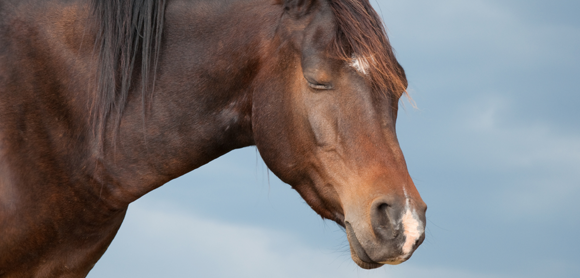
How do horses sleep?
Just like humans, horses need a certain amount of sleep to be healthy, so what happens if they are sleep deprived and how can owners ensure their horses get enough sleep?
Expert contributor: Justine Harrison, behaviourist, and vet Juliette Edmonds
Approved by Justine and Juliette.
We all know how it feels when we don’t get enough sleep. Managing simple, everyday tasks becomes a challenge because we lack energy and motivation, and we are often grumpy and short-tempered. It’s also harder to concentrate and learn new things when we’re tired.
The same can happen to our horses, and although they don’t need as many hours of sleep in a 24-hour period as us, they do need a certain amount of quality sleep in order to stay healthy.
Quick Links
How do horses sleep?
Compared to our seven-to-nine hours of undisturbed slumber a night, horses only need around four to five hours in a 24-hour period, some of which is made up of dozing while standing up, and deep sleep while lying down.
There are three stages of sleep. Horses can achieve stages one (light sleep) and two (slow wave or deep sleep) while standing up. Horses often engage their stay apparatus (collection of tendons and ligaments in the horse’s limbs that enable the horse to stay standing while using minimal muscular effort) to avoid falling over while dozing. This also enables them to run away more easily should a threat appear.
But the third stage – rapid eye movement (REM) sleep – occurs only while the horse is lying down due to the complete muscle relaxation required.
‘We believe that horses need around 30 minutes of REM sleep every day to avoid becoming sleep-deprived,’ says equine behaviourist Justine Harrison. ‘This deep stage of sleep is essential and offers many benefits – the body repairs itself, the immune system is strengthened and memories are established, meaning this stage of sleep is essential for learning.’
When they are ready to sleep, horses will seek a sheltered environment where they feel safe. They will adopt a certain posture such as head down and resting a back leg, or lying down, and stop responding to external stimuli. During deep sleep, horses enter a state of temporary unconsciousness and their muscles become inactive and relaxed.
Sleep deprivation in horses
When your horse doesn’t get enough sleep, it can put them at risk of serious injury, but it can also affect their behaviour – they may become anxious, spooky or even aggressive.
‘If horses don’t lie down to sleep for any reason, REM sleep deficiency occurs,’ says Petplan Equine veterinary expert Juliette Edmonds. ‘As a result, horses may fall into REM sleep while standing, which causes them to collapse due to the associated muscle relaxation. These collapses can cause severe injuries to the horse, and put their owners at risk.’
Symptoms your horse is sleep deprived:
- Falling asleep when standing and dropping to their knees.
- Developing unexplained injuries – cuts or swelling to their knees, fronts of fetlocks and hocks, as well as injuries to their head.
- More lethargic or slower to learn than usual.
- More anxious, reactive or spooky with an increase in aggressive behaviours.
‘Probably the most common physical reason we, as vets, identify for sleep deprivation would be orthopaedic pain,’ says Juliette. ‘For example, if the limbs are uncomfortable or weak when getting up, then the horse will often avoid lying down in the first place – a situation most often seen in older horses with arthritis, particularly if the hindlimbs are painful.’
She adds: ‘This could also occur in any horse with an injury that makes getting up painful or difficult, or in horses that are cross-tied for any injury to prevent them lying down for a period of time.’
It’s important to try and differentiate sleep deprivation from other disorders in horses that collapse, such as true narcolepsy, seizures or orthopaedic problems causing weakness or in-coordination.
Ways to encourage a good night’s sleep
If your horse is showing signs that they aren’t getting enough sleep, there are changes you can make to their management to encourage more shut-eye.
‘The first big consideration is whether your horse feels safe enough to lie down and get REM sleep,’ says Justine. ‘In their natural environment, horses have members of the herd to watch over them and keep an eye out for danger while they sleep. That’s why ensuring your horse has company – both in and out of the stable – will go a long way to encouraging your horse to sleep well.’
Having enough room in their stable to lie down can also impact a horse’s sleep. ‘If they are stabled, make sure they have enough room to lie out flat and get down and up safely and easily,’ advises Justine. ‘Research has also shown that horses will sleep for much longer periods on a deep straw bed than when bedded on shavings or a thin layer of bedding.’
Like us, horses also prefer low light and a quiet atmosphere to get quality sleep. ‘Turn the stable or barn lights off at night, and keep the yard as quiet as possible,’ adds Justine.
Night-time behaviour
Because horses don’t require as much sleep as us, they tend to be more active at night and will carry out behaviours such as grazing, moving around and socialising with other horses.
‘Horses can see better at night and in dimmer light than humans,’ explains Justine. ‘Research has shown that horses can make out objects in nearly complete darkness, meaning they can also negotiate uneven terrain at night.’
Some research also suggests that horses graze more at night than during the day, especially in the spring and summer when food is abundant and the weather is warm.
How do you ensure your horse gets a good night’s sleep? Why not share your tips on our Facebook page and find out what other owners do?



